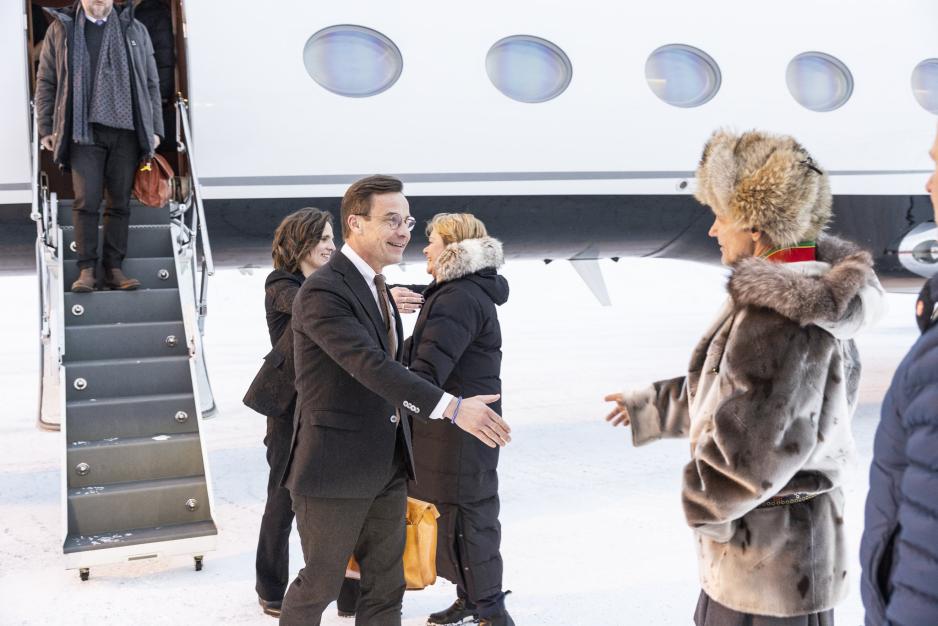Arne O. Holm says The Arctic Can Free Us From the Iron Grip of Dictatorships

The Swedish Government, with Prime Minister Ulf Kristersson in front, arrives in Kiruna for the EU meeting on the 12th of January. (Photo: The Swedish Government)
(Commentary) If anyone still doubts the Arctic's role as an industrial and democratic engine in an uncertain world, the last few days have provided some news. In Sweden, which is currently taking over the presidency of the EU Council, the state-owned mining giant LKAB took the opportunity to report a discovery that could destroy China's commodity grip on the Western world.
Then add that Norway, with gas extracted from the Arctic seabed, is about to fill the void that has appeared after Russia's bloody war against Ukraine.
Critical for Europe
Sweden has taken over the presidency of the EU Council in a very critical period for Europe. For the next six months, the Swedish Government will lead about 3000 meetings for the European Union. It is a new and inexperienced Swedish government that is taking on the task. A task where it must also consider that its supporting party in the Riksdag, the Sweden Democrats, are EU opponents.
The room for action is nevertheless limited. Most of the issues that are up for processing have already been determined long before Sweden took over, and will not be concluded until the presidency is passed on to Spain later this year. The task will instead be to find a balance between 27 member countries, rather than putting an entirely Swedish mark on European development.
That is exactly why the Swedish "opening sequence" is so important and interesting.
Traveled to Kiruna
Traditionally, these council meetings have taken place in the respective countries' capitals. Sweden wanted it differently and instead invited the EU Commission to Kiruna, Sweden's northernmost city.
Export of commodities and democracy.
That in itself is spectacular enough. Perhaps so spectacular that the commission's members, who mostly reside in hotel rooms across Europe, will remember where they have been and bring new knowledge with them into the European bureaucracy grinder in Brussels.
In Kiruna, the commission meets a mining company at the forefront of the shift to what is called green industry production. The gigantic iron ore mine, which ships large parts of its production to the European market out from Narvik in Northern Norway, had a staggering result of SEK 27 million in 2021.
The wartime economy and its consecutive increased need for exactly iron ore are still driving the prices up.
Limited knowledge
This production is so important that the Swedish government could house the commission members in an entirely new city. New cities are no longer being built in Europe, but in the Arctic, the old city center of Kiruna was demolished in order to make more room for mining. Its inhabitants could move a few kilometers from the old center before the turn of the year.
Such an Arctic investment should make an impression on a European Commission with limited knowledge of what goes on in the High North.
Could destroy China's commodity grip on the Western world.
However, the Swedish state and LKAB had more in store when the EU Council started its meeting.
In a press release made public at the opening of the meeting, LKAB reported that they had found by far Europe's largest deposit of so-called rare earth metals. This finding, which is essential for the green shift within electrification and the production of wind turbines, among other things, amounts to one million tonnes.
The industrial significance is considerable, but so is the fact that this discovery will be able to replace China's near-monopoly on such metals. At a time when Europe and large parts of the world are trying to detach themselves from the dependence on dictatorships such as China and Russia, the political dimension of this discovery can hardly be overestimated.
The same can also be said about Norwegian gas production. Last year, the Norwegian market share of Germany's gas consumption increased from 20 to 33 percent. Germany is Europe's largest consumer of natural gas and they are fighting a tough battle to escape the clutches of Russia. Clutches they incidentally have placed themselves in.
Clutches Germany has placed itself in.
Export of democracy
These two examples alone illustrate the significance the Arctic and the High North have for the rest of Europe, for the war in Ukraine, and for the trade war between East and West.
It is not just about exporting raw materials. It is just as much about the export of democratic ideals.
If you look at the northern parts of Norway, Sweden, and Finland collectively, you will find investment plans in the EUR 250 billion scope.
Making this potential visible is perhaps one of the most important things Sweden can achieve through its presidency of the EU Council.
In that case, they also do it on behalf of Norway, the outsider.
Also read
This commentary was originally published in Norwegian and has been translated by Birgitte Annie Molid Martinussen.


